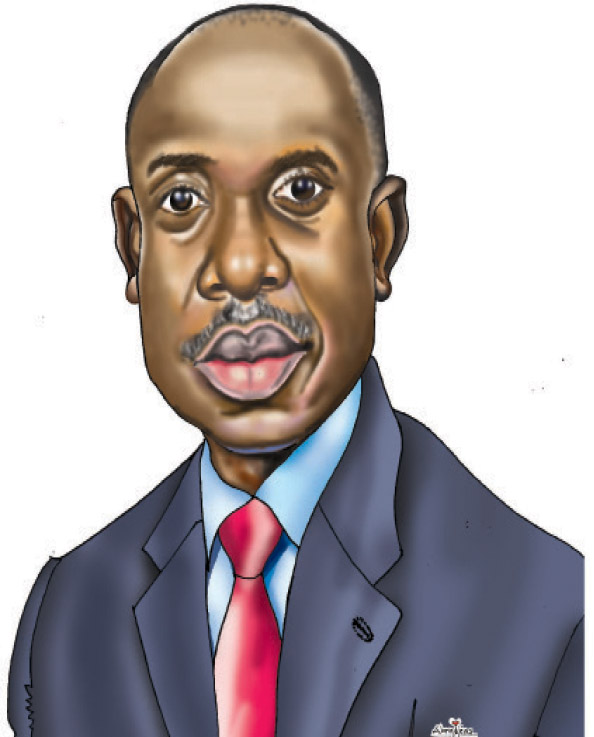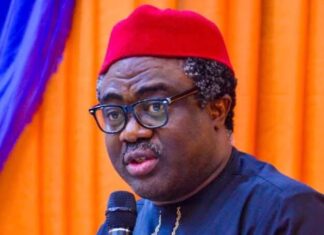The scheduled inauguration of Kaduna/Abuja railway next month speaks volumes of the Transport Minister who promised that his ministry would ensure completion of all existing projects under his ministry within the first tenure of the current dispensation, writes Correspondent, SAM NWOKORO.
t is not easy to man a government department such as the Ministry of Transportation in Nigeria. Reason: The issue of infrastructure development in the country, most times, is politicised. Thus, most projects are abandoned. Some projects see many governments and tenures.
If there is any sector of the nation’s economy that holds the key to her rapid industrial growth, it is the rail sector because of the capability of the train to haul goods and personnel in large numbers, and at a relatively cheap rate. It is the common man’s most convenient means of transportation, both in developing and developed countries. The rail system is the springboard of industrialisation.
Nigeria’s rail system has been the most politicised in the nation’s infrastructure politics. This is understandable at a time land and air transportation is increasingly becoming risky.
However, the news that Rotimi Amaechi, the Transport Minister, has deemed it fit to break this jinx by tackling head-on the projects initiated by the immediate past government is cheering. The Minister of Transport did not resort to the old tactics of always abandoning projects initiated by their predecessors or inflating the cost for selfish reasons. Rather he went outright to itemise those that are of strategic importance to the nation’s growth aspirations and continued with them without looking back.
The result of this first-of-its-kind demonstration of public spirit is the scheduled flag-off of service on the newly constructed Kaduna-Abuja rail line. Barring any last minute hitch, this new rail service will commence operation first week of July when President Muhammadu Buhari is billed to formally flag it off.
This will probably be the first major federal project Buhari will commission. Perhaps that will mark the real change in tangible terms that Nigerians have been clamouring for, and which the All Progressives Congress (APC) government promised.
Assurance
Last week, after what seemed like his last inspection tour of the project, Amaechi told journalists who accompanied him on the tour: “We are looking at the first week of July because we are good to go. In two weeks from now, the contractors will test-run the tracks without carrying passengers? In another two weeks, they will test-run it with passengers free of charge, and that will take us to the last week. So by first week of July, the President will come to flag it off for commercial activities. After the flag-off, anyone who boards must pay, and that is why I told the director of Nigerian Railway Services to start ensuring that within this one month, they should make sure that people who are going to use this railway have a firm identification.”
And to ensure the safety of the users in these times of terrorism and threatening sabotage of government property here and there, the minister designed safety standards. He explained: “About identity, the Ministry of Transportation should work with Nigeria Identity Management Commission (NIMC) for identification of users. One thousand police officers would provide security for the rail service daily.”
Amaechi’s determination to make a difference in the transport sector is a continuation of his achievement in Rivers State as governor. He modernised Port Harcourt megalopolis, to the extent that United Nations Educational, Scientific and Cultural Organisation (UNESCO) recognised the Garden City as the world’s Book Centre.
Life-changing infrastructure
The completed Lagos-Kaduna rail line is a milestone in Nigeria’s transport infrastructure development. Reporting on project, a London-based international journal recognised by the World Bank as an authoritative voice in transportation round the world, Railway Technology.Com, reported: “The Abuja-Kaduna rail line is one of the first Standard Gauge Railway Modernisation Projects (SGRMPs) undertaken in Nigeria, the most populous country in Africa.”
President, Initiative for Infrastructure and Modern City Development (IIMCD) and Country Co-coordinator of the Annual Global Infrastructure Leadership in Nigeria, Daniel Omonze, said during the 2015 London forum held at Queen Elizabeth Conference Centre in London that the 186km Abuja-Kaduna rail project was listed among the top 100 infrastructure projects in the world. It remains, at press time, one of the successfully executed China-Nigeria business partnership arrangements. It was built on the basis of Build Operate and Transfer (BOT) mode for 30 years.
The Nigerian Railway Corporation (NRC) has equally been receiving public acclaim for the tenacity of purpose it has deployed in ensuring the completion of the project.
Details of the rail line
The Abuja-Kaduna rail line is 186km with standard gauge railway tracks from Idu, near Abuja, to Kaduna in the North West. It has nine stations and features both passenger and cargo trains.
The passenger trains on the line can operate at a speed between 200km/h and 250km/h. The travel time between Abuja and Kaduna will be reduced to one hour, and each passenger train can carry up to 5,000 commuters.
The cargo trains, carrying 800 tonnes of goods, will take one and half hours to travel between the two cities.
The Federal Executive Council (FEC) earmarked N1.1 billion in October 2014, for the procurement of two locomotives for the Abuja-Kaduna standard-gauge rail lines.
Financing and construction: The project is estimated to cost $874 million. China’s EXIM bank provided $500 million as a concessionary loan for the project. The remainder was provided by Nigeria.
Contract for building the new line was awarded in December 2010. Track-laying for the single standard gauge line was officially launched in July 2013.
The rail line construction was 68 per cent complete by July 2013 with the earthwork 92 per cent complete and hydraulic structures 87 per cent complete. Approximately 85 per cent of the construction was finished by October 2014 and final works were concluded by early December.
The rail line involved the construction of 30 railway bridges, including five box bridges. The bridges are built with precast T-beams. By mid-2013, 187 out of the total 348 precast T-beams were produced and 52 of these were successfully installed. Each T-beam is 2.5 metres in height and 120 tonnes in weight.
The man
Chibuike Rotimi Amaechi, born May 27, 1965, served as the fifth governor of Rivers State from 2007 to 2015. He was re-elected for a second term on April 26, 2011. Amaechi was a member of the Peoples Democratic Party (PDP) before defecting to APC on November 27, 2013.
Amaechi was born in Ubima, Ikwerre Local Government Area of Rivers, to Elder Fidelis Amaechi and Mrs. Mary Amaechi. He was raised in Diobu, a densely-populated neighbourhood in Port Harcourt, and had his early education at St. Theresa’s Primary School from 1970 to 1976. He earned his West African School Certificate in 1982 after attending Government Secondary School, Okolobiri. He received a Bachelor of Arts degree (Honours) in English Studies and Literature from the University of Port Harcourt (UNIPORT) in 1987, where he was the president of the National Union of Rivers State Students (NURSS).
He completed the mandatory National Youth Service in 1988. He thereafter joined the services of Pamo Clinics and Hospitals Limited owned by Dr. Peter Odili, a former governor of Rivers where he worked until 1992.
Amaechi cut his teeth in politics as secretary of the now defunct National Republican Convention (NRC) in Ikwerre.
He was Special Assistant to Odili as deputy to Governor Rufus Ada-George in the Third Republic.
Odili believed in him as a young man with potential in politics and adopted him as a political son, guiding and nurturing him in politics, and consequently facilitating his election into the Rivers State House of Assembly in 1999. He won a seat in House of Assembly, and was subsequently elected the Speaker. He was elected the Chairman of Nigeria’s Conference of Speakers of State Assemblies.
He was re-elected into the House of Assembly in May 2003. Same year, when the National Assembly moved to hijack the legislative functions of the House of Assembly, Amaechi and his colleagues took the matter to the Supreme Court which ruled that the control and supervision of local government is the prerogative of the House of Assembly.
The cordial relationship between Amaechi and Odili translated into the harmony between the executive and legislative arms of government in Rivers, until Amaechi launched a campaign against the state government, in an effort to succeed Odili as governor in 2007.
He contested and won the PDP primary for Rivers governorship in 2007. His name was substituted and he took the case to the Supreme Court. He became governor on October 26, 2007, after the Supreme Court pronounced him the rightful candidate of the PDP and winner of the April 2007 governorship election in Rivers. He was re-elected for another term of four years in April 2011.
His administration invested in infrastructure development, construction of roads and bridges, sticking to the vision of connecting all parts of the state by road. He was also committed to urban renewal and modernisation of transportation services.
Amaechi, who holds the National honour of the Commander of the Order of the Niger (CON), is a Catholic and a Knight of St. John.
He was the Director-general of the APC Presidential Campaign that threw up the Buhari government, and was subsequently appointed Minister of Transportation on November 11, 2015.
His marriage to Judith produced three boys (Obinna, Chimkamkpa and Lemchi).














